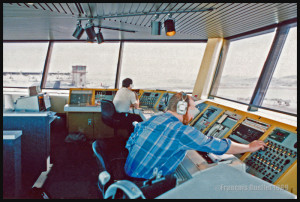1989 was a problematic year for the Transport Canada flight service specialists (FSS) in Iqaluit as we had problems communicating by means of HF frequencies with airliners crossing the North Atlantic.
As usual, we tried to get position reports at 60, 70 and 80 degree west in order to ensure that the Montreal, Gander, Winnipeg and Edmonton area control centers could provide accurate air traffic services by maintaining ten minutes or eighty nautical miles between each aircraft. We had to note the route, the actual and next position of the aircrafts, the different time, speed and altitude, this while we relayed ATC clearances.
But for many weeks in February and March, the radio communications were blocked by a solar storm that was strong enough to cause problems to the Hydro-Québec electrical network. The entire province of Quebec suffered an electrical power blackout that lasted nine hours on March 13th.
During a major solar storm, the full spectrum of HF frequencies can become useless for frequent periods varying from ten minutes to an hour.
I remember several problematic cases, among which one where an area control center controller asked us to contact an airliner to know if the pilot could climb to 37,000 feet once at 70 degree west. The question was transmitted to the pilot and he immediately replied: “Roger, we are climbing 370”. He had not received any clearance to change his altitude but he was nonetheless starting to climb where there was no adequate separation between him and other aircrafts.
We replied multiple times: “Negative, this is a question, this is not a clearance, do not climb to flight level 370”, but the pilot never replied back due to the poor quality of HF communications. The control center was quickly called back and advised of the situation.
For the remaining period of the solar storm, the flight service specialists were asked about the actual quality of the HF communications before any punctual requests was sent on radio in order to avoid problems.
For more real life stories as a FSS in Iqaluit, click on the following link: Flight service specialist (FSS) in Iqaluit
